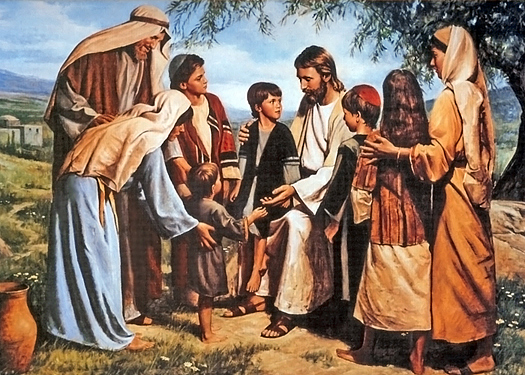Readings: Acts 4:32-35 | 1 John 1:1-2:2 | John 20:19-31
Text: 1 John 1:1—2:2
In the Introit at the beginning of service this morning, we heard: “Like newborn infants, long for the pure spiritual milk, that by it you may grow up to salvation—if indeed you have tasted that the Lord is good.” (1 Peter 2:2-3)

Newborn babes are what Christians are to be like. What does that mean?
They need to be nurtured by the pure spiritual milk of God’s Word.
Breastmilk from one’s own mother is always best. Although there are manmade alternatives and sometimes circumstances prevent this, the ideal is what God has given in breastfeeding. The milk grows with the child and gives him the nutrients needed for each stage of development. Breastmilk also contains personalized antibodies which the mother’s body wisely produces to combat infections.
What that means for us as children of God is that His Word nurtures us and causes us to grow up to salvation. He feeds us at the breast of our mother, the Church. In her bosom—not a manmade institution, but where He preserves the preaching of His holy Gospel and His means of grace—this is where we receive that precious spiritual milk of God’s Word.


At every stage, from newborn in the faith (whether you come new to the world, or highly weathered) all the way through temptation and tribulation, through times where you feel the world’s opposition and times of doubt, perhaps even through a time of falling away, but finally unto the end of your earthly life. God gives each of us in His Word the milk and meat, the Body and Blood, the Confession and Absolution, that we need for each day.
Our wise Father gives us antidotes to the deceitful schemes of the devil, the delusions and excuses we tell ourselves, the apathy we sometimes develop toward His precious gifts. With His Word and His Holy Spirit, He delivers us from the evil one and keeps us as His children and heirs of eternal life.
Newborn babes are utterly dependent.
Nobody would be so cruel to say a baby ought to feed, change, or dress herself. Newborns especially need constant care, no matter how much that takes out of the parents. God gives the strength they need, because it’s through mom and dad that He is caring for this fragile little human.

Likewise, the Christian is constantly dependent on God’s care. Yes, we grow and mature, for we “grow in the grace and knowledge of our Lord and Savior Jesus Christ,” “that we may no longer be children, tossed to and fro by the waves and carried about by every wind of doctrine” (2 Pet. 3:18; Eph. 4:14). But God also knows that we are but dust and ashes, that “the spirit indeed is willing, but the flesh is weak” and “nothing good dwells in me, that is, in my flesh.” (Gen. 18:27; Matt. 26:41; Rom. 7:18).
Because of this, we are forever dependent upon God caring for us. God must feed us (because like children, we only want the sweets that make us feel good in the moment). We need to be shepherd by the Lord through His servant (not thinking ourselves strong enough to wander apart from the flock, and not charging on ahead in sophomoric foolishness). Christ must clean us up as often as we make a mess, and we must always be clothed by Him in His righteousness, and not run around naked.
This is to say God knows we always need to be nurtured with the basics:
That which was from the beginning, which we have heard, which we have seen with our eyes, which we looked upon and have touched with our hands, concerning the word of life— 2 the life was made manifest, and we have seen it, and testify to it and proclaim to you the eternal life, which was with the Father and was made manifest to us— 3 that which we have seen and heard we proclaim also to you, so that you too may have fellowship with us; and indeed our fellowship is with the Father and with his Son Jesus Christ.

The Holy Spirit speaking through John takes us to the foundation of the Church: The true and trustworthy witness of the Apostles, including Thomas, whom God made to be eyewitnesses of the marvelous works of Jesus Christ. In Him we have life, which has been revealed to us by God. Yet it’s more than me-and-Jesus, a personal fellowship with God, but that we also have fellowship with one another—this communion of saints who are called and made into the Body of the Church—with the Father and His Son, in the Holy Spirit.
5 This is the message we have heard from him and proclaim to you, that God is light, and in him is no darkness at all. 6 If we say we have fellowship with him while we walk in darkness, we lie and do not practice the truth. 7 But if we walk in the light, as he is in the light, we have fellowship with one another, and the blood of Jesus his Son cleanses us from all sin. 8 If we say we have no sin, we deceive ourselves, and the truth is not in us. 9 If we confess our sins, he is faithful and just to forgive us our sins and to cleanse us from all unrighteousness. 10 If we say we have not sinned, we make him a liar, and his word is not in us.
This must be the number one place that we fail. Why else would God always be talking about forgiveness of sins, self-deceit, true fellowship with Him, and His Son who takes away the sin of the world?

Yet, often people in the Church grow weary of hearing about the forgiveness of sins. Why is the liturgy always the same, and why do we need to confess our sins every week? Haven’t I already been forgiven? Wouldn’t that time be better spent singing songs we like and being instructed on how to live a better life?
If we think the forgiveness of our sins is a light matter that should be shuffled lower in the deck, then we need to read more of God’s Word (and come to Bible study!) and see how serious sin is to God, how deeply it’s broken our fellowship with Him and each other. Then, maybe we’ll better see what a treasure it is to hear these words of peace Christ puts on His servants’ lips: “If you forgive the sins of any, they are forgiven them [John 20:23]…In the stead and by the command of my Lord, Jesus Christ, I forgive you all your sins, in the Name of the Father and of the Son and of the Holy Spirit.”
It’s also our tendency to minimize sin because of what Jesus did on the cross. Excellent! Our debt is paid off! We’re free! Now any sins I commit aren’t really that bad to God because He’s bought and paid for them already! But to this self-deceit, He says, that we ought to “walk in the light as He is in the light.” Our walk before God is necessarily holy and in line with His will—no excuses. Our thoughts ought to be on the good and salvation of others, not on resentment and wishing them harm. Our tongues ought to be used for praise and building up, not telling off-color jokes or sniping people in online forums. Our deeds ought to be for the good of every person we see in need, not just empty talk about showing mercy.
And where we fail, our reaction dare not be, “Oh well. I might do better next time. Just give me a shot of forgiveness and I’ll be on my way…” It should be, “Dear Lord, I have sinned against you because I have not walked in the light. I have sinned in my heart, with my words, and my actions.” And to those who are contrite, He speaks this truth to you: “If we confess our sins, he is faithful and just to forgive us our sins and to cleanse us from all unrighteousness.” For those who prefer their self-delusion, their sins remain on them, in the fervent desire that they will turn back, for the Lord says, “Truly, I say to you, unless you turn and become like children, you will never enter the kingdom of heaven.” [Matt. 18:3]

Basics, and yet always the essential foundation. In God’s Word, that precious spiritual milk, “These things are written that you may believe, and that by believing, you may have life in His Name.” “I am writing these things to you so that you may not sin. But if anyone does sin, we have an advocate with the Father, Jesus Christ the Righteous.” It’s daily feeding, daily cleansing, and daily being clothed in the spotless robes of Christ.
And from this cradle of the Divine Service, where God gathers His Church, He sends us out indeed to walk and grow. As fruitful recipients of His forgiveness, we share that His blood was shed for the sins of all people. We forgive, as we are forgiven. As we mature, we long for more and more of God’s Word and He supplies it in daily devotions and Bible study. In this life He supplies and nurtures through His Word, we find all that we need for these days, and in the end eternal life. Amen.

Leave a Reply